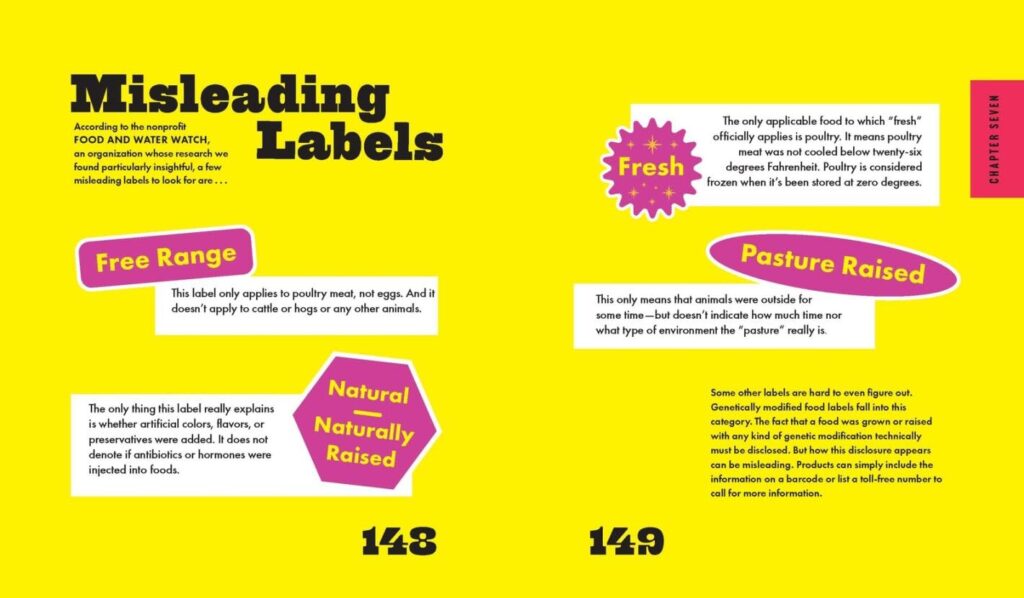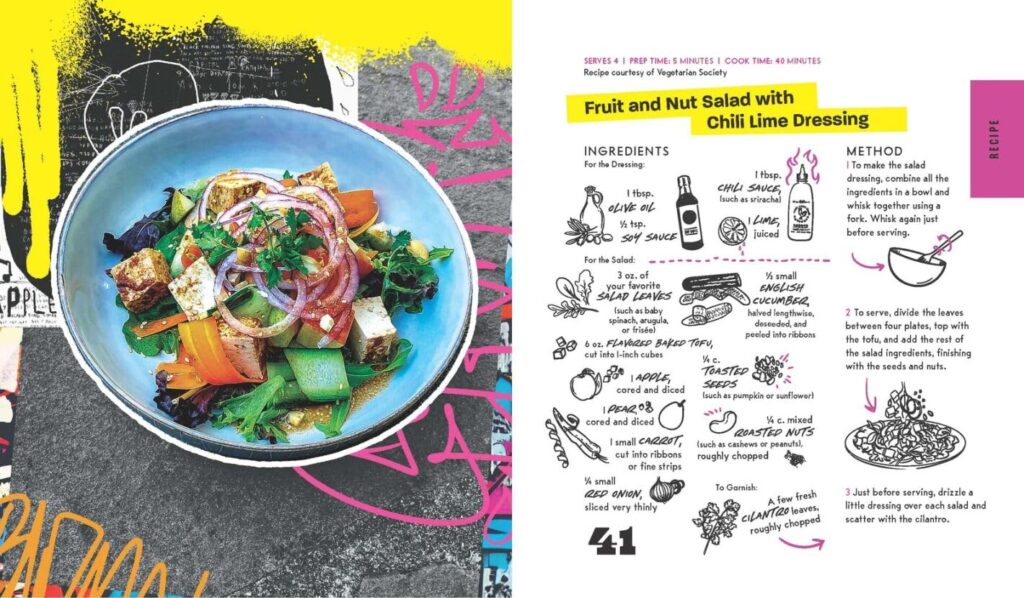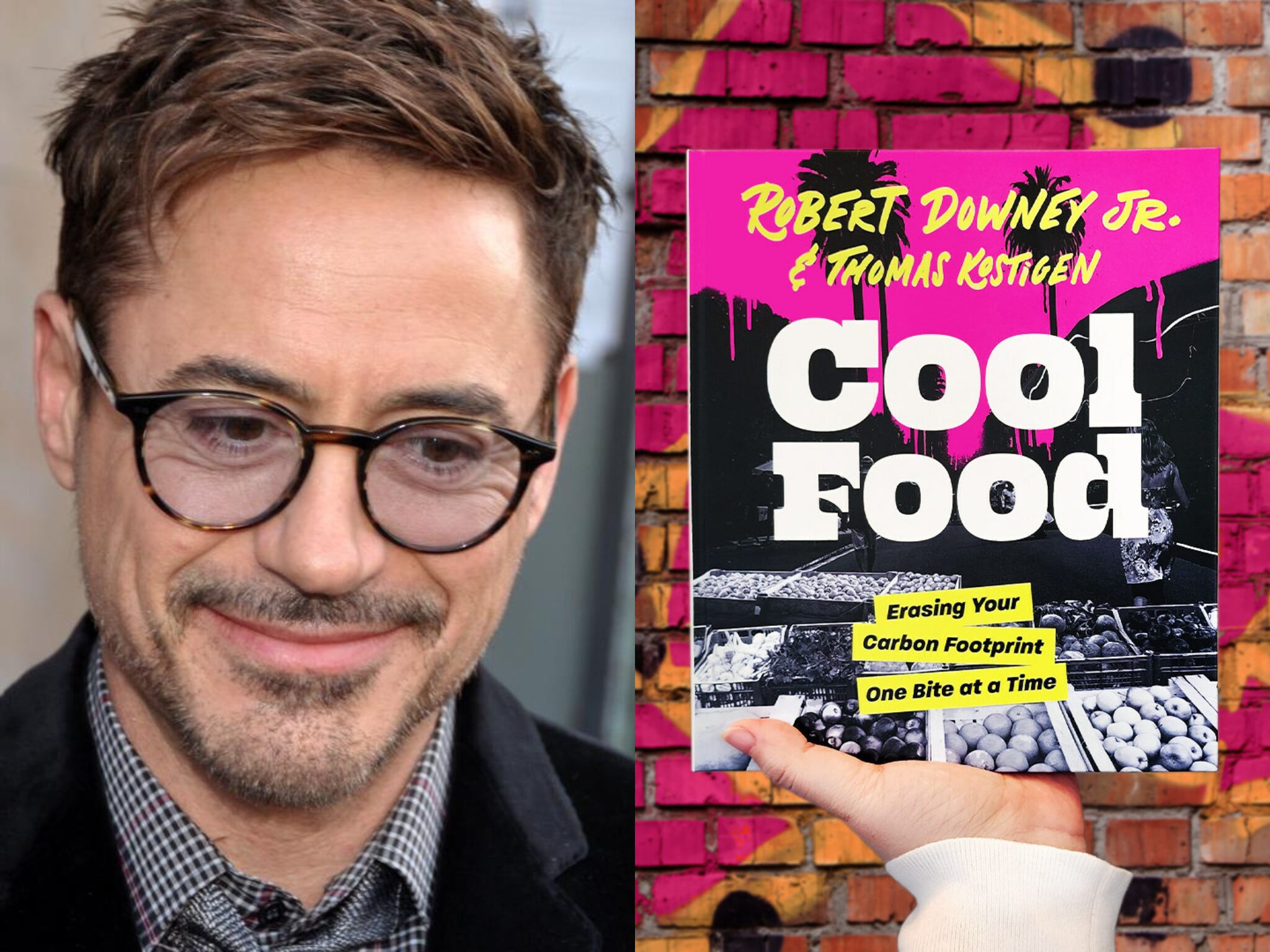Cool Food: Robert Downey Jr Says New Book Shows You How Your Diet Can Fix the Climate
8 Mins Read
In Cool Food, Robert Downey Jr and climate author Thomas Kostigen unveil a new category of food: one that’s better for you and the planet. There’s talk about ancient grains, future foods, meal kits, shopping lists, recipes, and the Iron Man actor’s diet (which isn’t vegan).
Robert Downey Jr is the quintessential cool guy. He always has been. And it’s a persona that was projected to the world through his 11-year-long stint in the Marvel Cinematic Universe as Iron Man – Downey Jr was an Avenger, or was the Avenger Downey Jr?
Now, five years on from telling Thanos he’s Iron Man, Downey Jr is expanding his cool-guy routine with a debut book that focuses on climate change and food, aptly named Cool Food. Co-written alongside Thomas Kostigen, a New York Times-bestselling author of 10 climate books prior to this one, the title is said to refer to a “game-changing, new food category” and thought of school that can help fix the climate crisis.
It’s not a full cookbook (though it does have around two dozen self-described climate-friendly recipes) – instead, Cool Food covers a broader range of solutions. There are insights from “top chefs, food scientists, farmers, foodies, celebrities, politicians, and more”, centring on revolutionary farming techniques, future foods and alternative proteins, seasonal grocery shopping, and planet-friendly eating.
What is Cool Food?
But wait, what really is Cool Food? I’ll let RDJ spell it out for you. “Cool food is a new category in the food space. It’s a different way to eat to save the planet. It isn’t a diet or a meal plan. It isn’t even so much about food itself,” he writes in the book. “Cool food is really about lifestyle – transformational shifts from little actions, experiences, and different choices. It’s a holistic approach to making the world a whole lot better by simply making more informed decisions about something that each and every one of us does anyway – eat.”
He adds that this book is much more than just a list of which cool foods are best for the climate”. There are commentaries, anecdotes, factoids, and hard science that add up to something we think is worth your time to read from beginning to end,” notes the Iron Man actor.
“Think of cool foods as the equivalent of alternative power sources – food’s solar or wind power. Our book, Cool Food, is about learning and getting in on the future of food now,” adds Kostigen.
The book’s publishers say more than two billion ‘cool food’ meals are already served each year, and that’s a number expected to grow massively. They add that supermarkets, restaurants, fast-food chains, and student cafeterias globally are increasingly designating menu items as ‘cool food’, with some using carbon labels like calorie amounts alongside ingredients and meals.
It’s really a term for low-carbon foods – akin to the World Resouces Institute’s Coolfood initiative – which can help bring the Earth’s temperatures down and mitigate the impact of climate change. This means foodstuffs like “certain nuts, fruits and vegetables, ancient grains, seaweeds, and less-processed foods that keep more carbon dioxide in the ground, or in the ocean”.
What’s in the Cool Food book?
So what does Downey Jr and Kostigen’s book offer? “We look at food as the entry point for stories, like how my wife, Susan, and I fell in love in Montreal and the role maple syrup played in that,” writes the MCU star. “Or like the lightbulb moment I had over a meal in 2019 to start FootPrint Coalition, the company I founded to discover, partner, and invest in climate technologies.”
The book contains data and information, actionable items and recipes to help people tread a more sustainable dietary path, based on the authors’ conversations with global experts. This includes facts like switching a burger for a salad once a week in the US would save pollution from 12 million cars, or sea lettuce is 20 times more efficient at sweeping carbon than land-grown. Donwy Jr and Kostigen also touch upon the power of ancient grains, which are “not old, and definitely not spoiled”, explaining how this is a marketing term that seeks to describe grains that haven’t been altered much by modern farming.
There’s discourse about transformative farming techniques for eco-friendlier food production (such as future foods made from thin air), the pros and cons of plant-based meat, and misleading labels. The latter includes little factoids like how ‘pasture-raised’ only means that animals were outside for some time, but doesn’t detail how much time, and what type of environment the ‘pasture’ really is; or how ‘natural’ labels really just explain if there are artificial colours, flavours or preservatives added, not if antibiotics or hormones were injected into the food.

This kind of myth-busting is a theme throughout the book. The authors do the same for perceptions about food miles, deliveries, virtual shopping, meal kits, food waste, spoilage, expiration dates, organic labels, and more.
“You can just flip open and go: ‘Hey, this is great. Almonds, pretty good. Cashews, better. Mangoes are great,'” Downey Jr told Good Morning America (GMA), alluding to the shopping lists and meal prep tips in Cool Food. “And then when I’m at the supermarket or when I’m making choices on set, or just grabbing a snack for the kids, I’m just kind of inserting this kinda data into our meal plans.”
Kostigen added that we need three things to survive: water, air and food. “Only one of those things has a variety that you can make a choice on, and that’s food. So why not make it better for the planet?” he posited. “For the average person, just being able to go to the grocery store and pick something up that is good for themselves, good for the planet, it’s empowering.”
But is Robert Downey Jr vegan himself?
That said, there are still some curious, contradictory things written in the book. For all the Marvel star’s musings about a planet-friendly diet, he isn’t actually vegan himself. And while that’s fine – a reduction in carbon-intensive food consumption can be viewed as more pragmatic compared to downright elimination – it’s the reasons he gives that perpetuate existing misconceptions, and need some myth-busting of their own.
“I tried going all-in vegetarian – even vegan – but it just doesn’t work for me. Without some animal protein, I find myself with low levels of vitamin B12, calcium, iodine and iron. These are common deficiencies that can result from vegan diets,” writes Downey Jr. “The rumours are true: I’m a pescatarian. That means I eat fish every now and again,” he adds. “Yes, in case you are wondering, I do actually need the iron that animal protein provides.”
This is a common criticism levied at plant-based diets. But it’s been proven that vegans can get just as much of these nutrients as meat-, dairy- and seafood-eaters do. Many plant-based foods – including seed, bean and nut milks, animal meat alternatives, cereals, nutritional yeast, and fruits and vegetables – are good sources of B vitamins, zinc, iron and calcium, among others. These are either found naturally, or through fortification.
New-age meat alternatives using mycelium contain nutrients usually associated with animal protein too. Plus, there are multiple supplements available for vegans as well, ensuring that they’re not deficient in any of these important nutrients. So while everybody is different and should consult medical professionals for tailored advice, Downey Jr could do better than rehashing stereotypes about the planet-friendly diets his book is promoting.
He could just listen to his wife Susan, who is a vegan. “Before that time, we used to love calamari,” he told GMA. “So, we came up with hearts of calipalmy [an analogue made from hearts of palm] because my kids don’t really know the difference.”

The recipes in Cool Food skew similar lines, ranging from a Moroccan okra stew with sweet potatoes and fruit and nut salad with chilli-lime dressing, to a vanilla butter cake made with Kernza and a crispy jellyfish dish. The sentiment is also evident in the section discussing the pros and cons of meat alternatives, which Downey Jr says are “as much as 90% better for the planet than animal meat”, but aren’t necessarily “healthier for you”. “You may be depriving your body of important nutrients such as vitamin B, certain fats, and calcium,” he writes.
This is a rhetoric plant-based meat companies have been fighting against for years, and it’s why giants like Beyond Meat and Impossible Foods (both of whose products are fortified with essential nutrients such as iron, calcium, and vitamins B and D12) have doubled down on the nutritional benefits of their products over the last few months, with products certified as heart-healthy by the American Heart Association.
You could just look at brands backed by Downey Jr himself. His climate tech VC fund the FootPrint Coalition backs New York-based Chunk Foods, which makes whole-cut meat analogues. Its flagship Chunk Steak is fortified with iron and B12. The fund has invested in mycelium meat maker MyForest Foods and cultivated seafood producer Wildtype too, though new investment action has been quiet of late.
So as the Oppenheimer actor sweeps the awards shows and stays the favourite for the Oscar, maybe he can ponder upon his own investment activity and narrative around planet-friendly cool food, and really put his money where his mouth is. As he explains in the book, it can be “cheaper and faster” to make vegan meals than anything made from traditional animal meat, if enough supply can be had to drive down costs. Could he drive that demand?
“Spread meat replacement efforts across the more than two hundred thousand fast-food spots in the US alone,” he writes, “and there is a seriously formidable agent of change that could turn things climate positive quickly.”
Cool Food by Robert Downey Jr and Thomas Kostigen is out now at bookshops and online stores internationally at $29.99.




